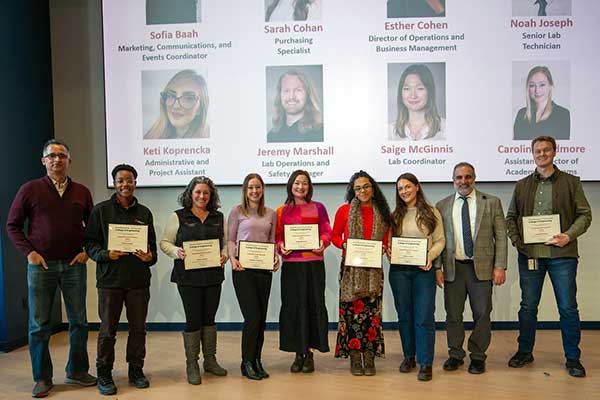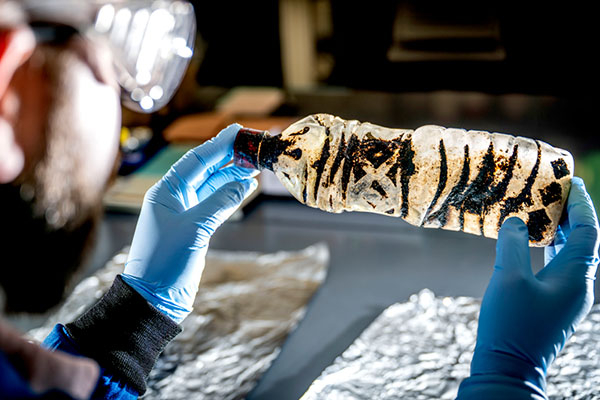Bryan James
Assistant Professor,
Chemical Engineering
Center Member,
The Plastics Center
Office
- 336 Mugar
- 617.373.5735
Lab
- 111 Mugar
Research Focus
Using green chemistry and engineering principles to design of functional, sustainable, and benign materials, products, and processes
About
Dr. Bryan D. James is an Assistant Professor in the Department of Chemical Engineering at Northeastern University. He leads the EcoBioMaterials Design Lab focused on creating functional, sustainable, and benign materials for a safer, cleaner future by innovating at each stage of the engineering design process. He actively collaborates globally with academic colleagues, NGOs, and industrial partners, regularly engages with K-12 students and educators, and advises policymakers. Bryan received his B.A.Sc. in materials engineering from the University of Toronto in 2017 and his Ph.D. in materials science and engineering from the University of Florida (UF) in 2021. At UF, as an NIH F31 Predoctoral Fellow under the mentorship of Josephine Allen, Bryan pioneered the use of nucleic acid-collagen complexes for hard and soft tissue engineering and championed investigating sex as a biological variable in biomaterials research, identifying mechanobiological sex differences in vascular cells. Thereafter, Bryan was a Postdoctoral Scholar/Investigator at the Woods Hole Oceanographic Institution (WHOI), working with Mark Hahn, Collin Ward, and Chris Reddy. His postdoctoral research focused on understanding the fate, persistence, and toxicity of plastic in the ocean to inform the rational design of next-generation materials that are safe for people and the planet.
Education
- BASc (Materials Engineering), University of Toronto, 2017
- PhD (Materials Science and Engineering), University of Florida, 2021
Honors & Awards
- 2026 Impact Award
Teaching Interests
- Chemical Engineering Process Control (CHME 4512)
Professional Affiliations
- American Chemical Society (ACS)
- American Association for the Advancement of Science (AAAS)
Research Overview
Using green chemistry and engineering principles to design of functional, sustainable, and benign materials, products, and processes

Selected Research Projects
- The rationale design of nucleic acids for use as multifunctional, green additives in next-generation plastics
- – Principal Investigator, American Chemical Society
Department Research Areas
Selected Publications
- Megill, C., Stevens, D. M., Reddy, C. M., James, B. D., Nelson, R. K., Dorman, F. L. Gas chromatography atmospheric pressure chemical ionization (GC-APCI) expands the analytical window for detection of large PAHs (≥ 24 ringed-carbons) in pyroplastics and other environmental matrices. ACS Omega. (2026).
- James, B. D., Bezerra, L. E. A., Buhler, D., Cavalcante, R. M., Chacon, M. L., Chen, B., Gros, J., Hanke, U. M., Lemkau, K. L., Nelson, R. K., Niles, S. F., Oliveira, A. H. B., Pitchford, T. D., Radović, J. R., Rodgers, R. P., Soares, M. O., Socolofsky, S. A., Summons, R. E., Swarthout, R. F., Teixeira, C. E. P., Valentine, D. L., White, H. K., Yang, M., Zhang, B., Zanardi-Lamardo, E., Reddy, C. M. Long-range transport of oil by marine plastic debris: Evidence from an 8500 km journey. Environmental Science & Technology. (2026)
- Maslowska-Jarzyna, K., Gomez-Maldonado, D., James, B. D., Christoff-Tempesta, T., Ehrmann, K., Comeo, E., Sarkar, S., Welch, C., Zhang, J.
Global Voices, Shared Futures: Early-Career Scientists on the Power of Collaboration. ACS Central Science. 11, 11, 2018–2021 (2025).
- Radović, J. R., James, B. D., Nelson, R. K., Hall, G. J., Frysinger, G. S., Sanders, R. W., Swathout, R. F., Valentine, D. L., Pawlowski, S. R., Seymour, B. T., Conlin, D. L., Lemkau, K. L., Barrett, M. J., Reddy, C. M. The black tears of USS Arizona: Forensic assessment of residual oil from the Pearl Harbor shipwreck. Marine Pollution Bulletin. 222, 1, 118674 (2025).
- Sun, Y., James, B. D., Houston, K. R., Edwards, B., Izallalen, M., Mazumder, S., Shankar, R., Reddy, C. M., Ward, C. P. Temperature Controls the Lifetimes and Microbial Communities Degrading Cellulose Diacetate in the Coastal Ocean. Environmental Science & Technology. 59, 36, 19468–19478 (2025).
- James, B. D., Sun, Y., Pate, K., Irving, B., Ward, C. P. Designing circular, sustainable, and nonpersistent consumer plastic products: a case study of drinking straws. Environmental Science & Technology. 59, 34, 18177–18189 (2025).
- Ward, C. P., Reddy, C. M., James, B. D., Initial estimates of the lifetime of unsmoked cellulose diacetate and paper cigarette filters in the coastal ocean. Environmental Science: Advances. 4, 1014-1023 (2025).
- Pipis, N.*, James, B. D.*, Allen, J. B. Multifunctional DNA-Collagen Biomaterials: Developmental Advances and Biomedical Applications. ACS Biomaterials Science & Engineering. 11, 3, 1253–1268(2025).
- James, B. D., Medvedev, A. V., Medvedeva, L. A., Martsen, E., Gorman, K. L., Lin, B., Makarov, S. S., Aluwihare, L. I., de Vos, A., Reddy, C. M., Hahn, M. E. Burnt plastic (pyroplastic) from the M/V X-Press Pearl ship fire and plastic spill contain compounds that activate endocrine and metabolism-related human and fish transcription factors. Environment & Health. 3, 1, 91–101 (2024).
- James, B. D., Sun, Y., Pate, K., Shankar, R., Izallalen, M., Mazumder, S., Perri, S. T., Houston, K. R., Edwards, B., de Wit, J., Reddy, C. M., Ward, C. P. Foaming enables material-efficient bioplastic products with minimal persistence. ACS Sustainable Chemistry & Engineering. 12, 43, 16030–16040 (2024).
- James, B. D., Medvedev, A. V., Makarov, S. S., Nelson, R. K., Reddy, C. M., Hahn, M. E. Moldable plastics (polycaprolactone) can be acutely toxic to developing zebrafish and activate nuclear receptors in mammalian cells. ACS Biomaterials Science & Engineering. 10, 8, 5237–5251 (2024).
- James, B. D., Sun, Y., Izallalen, M., Mazumder, S., Perri, S. T., Edwards, B., de Wit, J., Reddy, C. M., Ward, C. P. Strategies to reduce the environmental lifetimes of drinking straws in the coastal ocean. ACS Sustainable Chemistry & Engineering. 12, 6, 2404-24011 (2024).
- James, B. D., Ward, C. P., Hahn, M. E., Thorpe, S. J., Reddy, C. M. Minimizing the environmental impacts of plastic pollution through ecodesign of products with low environmental persistence. ACS Sustainable Chemistry & Engineering 12, 3, 1185-1194 (2024).

Jan 29, 2026
Faculty and Staff Awards 2026
Faculty and staff were recognized at the 28th Annual College of Engineering Faculty and Staff Awards for their exceptional service and dedication in support of students, the COE community, and the university during the 2025-2026 academic year.
Jan 23, 2026
Spring 2026 PEAK Experiences Awardees for Undergrad Research
Several COE, Bouvé, COS, DMSB, and Khoury students mentored by COE faculty are recipients of the Spring 2026 PEAK Experiences Awards from Northeastern’s Office of Undergraduate Research and Fellowships. This group of students from across the university will explore a wide variety of topics and questions from developing brain-computer interfaces, to analyzing air quiality data to inform future legislation, Socioeconomic Factors impact on twin infants, and more.

Jan 20, 2026
A Link Across the Ocean Using Biomarkers in Oil
Assistant Professor Bryan James, chemical engineering, shares his research regarding the 2019 oil spill in Brazil, linking it to a German supply ship through biomarkers.

Jan 08, 2026
Tracking the 8,500 km Journey of Petroplastic Pollutants
ChE Assistant Professor Bryan James is the lead author of a new study on “Long-range transport of oil by marine plastic debris: Evidence from an 8500 km journey,” which was published in Environmental Science & Technology.

Dec 01, 2025
Early-Career Scientists Call for Global Collaboration to Tackle Global Challenges
ChE Assistant Professor Bryan James co-authored the editorial, “Global Voices, Shared Futures: Early-Career Scientists on the Power of Collaboration,” which was published in the American Chemical Society journal ACS Central Science. The international team published the editorial to highlight barriers to scientific exchange and propose solutions.

Oct 24, 2025
Methane-based straws have lower environmental impact than paper, study finds
ChE Assistant Professor Bryan James was featured in the Packaging Insights article “Methane-based straws have lower environmental impact than paper, study finds.”

Aug 22, 2025
Strategies for Designing “Green” Plastic Products
ChE Assistant Professor Bryan James, alongside Collin Ward, Yanchen Sun, Brenden Irving, and Kali Pate from Woods Hole Oceanographic Institution, published their research on “Strategies for designing circular, sustainable, and non-persistent consumer plastic products: a case study of drinking straws” in Environmental Science & Technology.

Dec 11, 2024
New Faculty Spotlight: Bryan James
Bryan James joins the chemical engineering department in January 2025 as an assistant professor.
